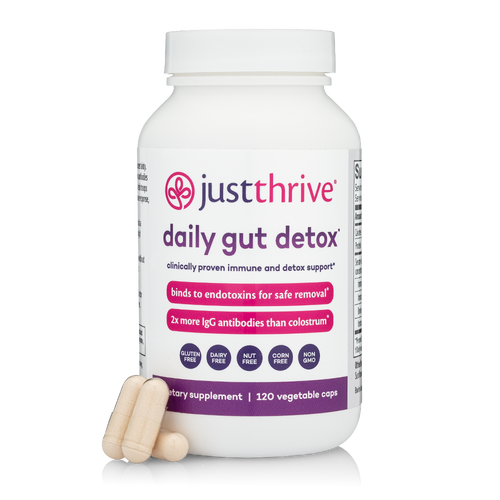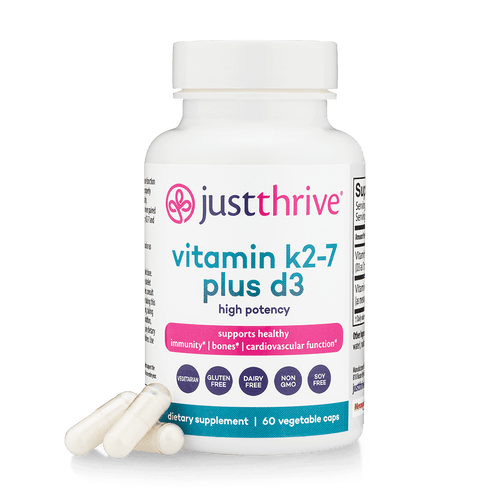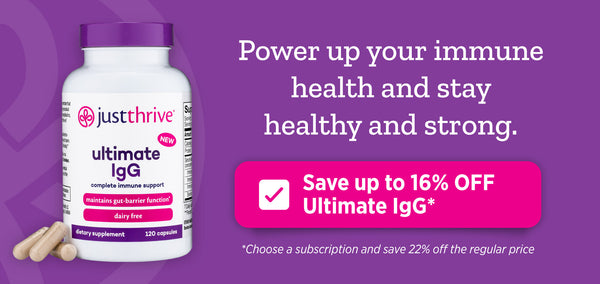Learn more about antibodies, the different types (immunoglobulins), and how to support your body's antibody production for optimal immune health.
Here’s a sobering thought: your body is under attack.
In fact, your body is always under attack.
Even if you don’t feel it, bacteria, viruses, parasites, germs, and other microbes are constantly invading your body. And they can wreak havoc, causing everything from infections to illnesses.
Luckily, your body has developed a unique way to keep you healthy.
It fortifies itself by producing antibodies, which can fight off and even eliminate these threats.
But what exactly are antibodies, and how can you make sure you have plenty of them?
Let’s take a look at how your body’s natural defense system works to keep you in prime health.
What Are Antibodies?
When your body is exposed to foreign substances such as bacteria, viruses, toxins, abnormal cells (such as cancer cells), and other possibly infectious organisms—collectively known as antigens—your immune system releases antibodies to reinforce itself.
Antibodies form a crucial part of your body’s natural “defense system.” They are proteins that travel through your body’s circulatory system, spotting and neutralizing harmful invaders.
The antibody protein forms in a Y shape. The bottom, or vertical, leg of the Y is its base, which helps it communicate with other parts of your immune system. The two arms or tips of the Y can bind to the antigens, triggering other cells to fight the invader.
How Antibodies Are Produced
There are two main triggers for antibody production: infections and vaccines.
- Antibodies can form in response to infections. A particular type of white blood cell, known as a plasma cell, produces antibodies when you have an infection. They’re incredible workers! In fact, one plasma cell can secrete anywhere from hundreds to thousands of antibodies in just one second.[1]
- Your body can also create specific antibodies as a reaction to a vaccine. Take, for example, one of the most common vaccines, the influenza (flu) vaccine. The vaccine imitates the flu, but in a weakened state that won’t endanger you or cause any major illness. When you receive your “flu shot,” your body creates the antibodies needed to fight the flu.
When Antibody Function Goes Awry
Normally, your body recognizes antigens and produces the antibodies needed to neutralize them.
However, things don’t always go according to plan.
Occasionally, your immune system fails to recognize (and thus ignore) the body’s own cells. Or, it may overreact to a safe substance, such as food. It mistakenly sees these as foreign invaders and produces antibodies that attack… itself.
When this occurs, it can cause inflammation and damage to your otherwise healthy cells, tissues, and organs, commonly known as an autoimmune disorder.

How Antibodies Keep You Healthy
A healthy, well-functioning immune system has high levels of antibodies even when it isn’t fighting off antigens. This surplus of antibodies includes those that target specific antigens, such as pollen or the influenza virus.
B Cells and T Cells
There are two main types of white blood cells that support your immune system, T-lymphocytes (T cells) and B-lymphocytes (B cells).[2]
- T cells detect when antigens have entered your body and activate the B cells. And, if that same “germ” returns, your T cells will recognize it.
- B cells develop into plasma cells that produce antibodies to fight off infections.
How Antibodies Fight Infections
The first time your body is exposed to an infection or other foreign substance, it can take several days for your body to recognize the antigen, produce antibodies, and eliminate the antigen.[3]
Luckily, the antibodies created in response to an antigen remain in your immune system even after that antigen has been eliminated. And, your body remembers what it learned the first time and is able to quickly recognize and fight off that foreign invader.
If that antigen should return, you have the right antibodies ready to go to work and keep your body healthy.
The length of time that an antibody lasts in your body varies from person to person and can also vary depending on the type of antibody.
Also, keep in mind that antibodies are produced to fight a particular infection. The antibodies created to fight off chicken pox, for example, will help you avoid a second case of chickenpox. But those same antibodies would be ineffective against measles.
Different Types of Antibodies
Your most important antibodies are immunoglobulins, and they can be classified according to their immune response jobs and their locations.
There are five major classes of immunoglobulins. Let’s take a look at each of these and how they keep you healthy.
Immunoglobulin G (IgG)
Immunoglobulin G (or IgG) is considered to be the most important of the antibodies when it comes to staying healthy. And what it lacks in size it makes up for in abundance. Although it’s the smallest antibody in your body, it’s also the most prevalent, making up roughly 80% of your immunoglobulins.
IgG is a great general-purpose antibody, fighting off viruses, bacteria, and toxins.
But it also has one unique function that makes it so critical.
IgG “remembers” past invaders and how they were defeated. So if the same germs attack your body again, your body is able to quickly respond by producing the right antibodies.
For pregnant women, IgG is critical not just for their health, but for that of their babies. As the only antibody that can be transferred through placenta, IgG provides natural immunity that supports a healthy fetus.
IgG is found in your blood, plasma, and most tissues.
Immunoglobulin A (IgA)
IgA is the antibody for bacteria and viruses. It’s also the second most abundant antibody, making up between 10% and 15% of the total immunoglobulins.[4]
IgA supports the health of mucosal surfaces (mouth, nose, eyes, and lungs) by stopping microbes, including bacteria and viruses, from attaching to their epithelial cells.
Like IgG, this immunoglobulin is important for expectant mothers. IgA is found in colostrum, the first milk produced during pregnancy, and helps fortify a newborn’s immune system.
IgA is found in body secretions such as saliva, sweat, tears, and all mucous secretions.
Immunoglobulin M (IgM)
IgM is the largest and one of the heaviest immunoglobulins, but it only makes up 10% of your antibodies.[5]
When your body is invaded by germs, bacteria, or other microbes, IgM is the first antibody produced. Although not as strong as other antibodies, they are able to keep your body healthy in the short term, until IgG and other antibodies are produced and delivered.
IgM is the earliest antibody to be present in your immune system, produced by fetuses before birth. It also has more antigen-binding sites than other immunoglobulins, which makes it highly effective at activating the immune system.
Typically, IgM is present in your vascular system, your blood and blood vessels. As it is your body’s main defense against blood infections, IgM deficiencies are often linked to septicemia (blood poisoning).[6]
Immunoglobulin D (IgD)
IgD is the least understood of all the immunoglobulins.
However, studies have found elevated levels of IgD present in participants with certain inflammatory autoimmune diseases, including lupus[7] and rheumatoid arthritis.[8]
IgD may also play a role in the growth, maturation, activation, and maintenance of antibody-producing B cells.[9]
IgD can be found in the tissues that line your chest and abdomen.
Immunoglobulin E (IgE)
Of all the antibodies, IgE is the least abundant, with a serum concentration 10,000 lower than IgG.[9]
IgE is mostly used as an antibody for pollen, animal dander, fungus, and other allergens. It can also help your body with inflammatory reactions, hypersensitivity, and helminthiasis (parasitic infections).
Found in respiratory secretions, IgE levels are significantly higher in people with allergic reactions including asthma, hay fever, and atopic dermatitis. In fact, IgE levels in response to specific allergens are often measured and used to diagnose the cause of allergies.

How to Promote Your Body's Antibody Production
One of the best things you can do for your body is to support the production of its natural antibodies so they have enough strength to keep fighting bacteria, viruses, toxins, and more.
To make sure your body stays healthy, make diet and lifestyle choices that promote the production of antibodies and support your immune response.
Here are some of the top ways you can help your antibodies do their job of keeping your body functioning at its prime.
Choose Healthy Foods
The right foods can be huge contributors to antibody production.
Foods high in vitamin C are thought to help your body produce more white blood cells[10], and thus more antibody-producing B cells.
Some good choices include:
- broccoli
- citrus foods (grapefruits, oranges, and tangerines)
- kale
- kiwi
- strawberries
- and sweet red pepper
Another good option is antioxidant-packed green tea. Green tea also contains amino acids, which help your T cells produce germ-fighting compounds.
Garlic is also a good choice. It stimulates cells that fight disease, helps regulate your immune system, and increases the production of T cells.
And since antibodies are proteins, consuming lean protein makes them even stronger.[11] Choose lean cuts of beef and pork, beans, soy, and seafood, all of which also contain zinc, a mineral that encourages antibody production.
Stay Hydrated
Water helps your body produce lymph, the liquid that transports white blood cells throughout your body. By staying well-hydrated, you can help those cells go where they are needed the most.
Along with drinking plenty of water, you can eat foods such as cucumbers, watermelon, celery, and others with a high water content.
Reduce Stress
A stress-filled life can have negative impacts on your sleep, relationships, mood, and even your antibodies.
Studies show that stress will reduce your body’s lymphocyte count.[12] These are the white blood cells that activate and produce antibodies.
Adopt stress-lowering activities such as meditation, yoga, journaling, and spending time in nature.
Exercise (Moderately)
Exercise gets your blood flowing, so your white blood cells and antibodies will travel through your body faster.
But don’t overdo it! High-intensity exercise can actually exhaust your body and reduce white blood cell production. Moderate exercise such as walking or yoga is better.
Take an Immunoglobulin Supplement
Sometimes, regardless of diet and lifestyle choices, your natural antibodies aren’t quite cutting it. You may notice yourself catching every little cold that goes around or having a hard time fighting off an infection.
One reason for this is that continuous exposure to hidden toxins in our environment, coupled with daily stress, can weaken your immune system.
Other times, even if you do have a strong immune system, encountering unfamiliar illnesses can still affect you. Occasionally, your body might not generate sufficient IgG antibodies to combat various threats, leading to potential health issues.
For all these reasons, it’s important to be proactive about your immune health by choosing an antibody-supporting supplement.
Here are a few things to look out for when choosing a supplement to fortify your immune system.
- Make sure it contains the right immunoglobulins. IgG is the most important in your body and should be present in strong concentration. A good supplement should also contain IgM and IgA, for your overall immune health.
- Choose a dairy-free supplement. Dairy ingredients such as lactose, casein, and B-lactoglobulin can cause mild inflammation in your body, taxing your already-low levels of antibodies.
Build Up Your Immune Health With Ultimate IgG
As mentioned, your body isn’t always strong enough to produce enough antibodies to fight off invaders. And even when it does, it won’t always produce the right types of antibodies.
But you can make sure your body has the antibodies it needs to keep you healthy with the most highly-concentrated antibody supplement on the market: Ultimate IgG.
Ultimate IgG contains more antibodies than any other immunity supplement, making it powerful, cost-effective, and the best choice for your immune system’s needs.
With Ultimate IgG, you get:
- Immunoglobulin G (IgG), arguably the most crucial of the immunoglobulins, making up about 80% of your antibodies. They remember the germs you’ve been exposed to, for a faster response time in the future.
- Immunoglobulin A (IgA), the antibodies found in your mucous membranes.
- Immunoglobulin M (IgM), which holds off new bacteria and germs until your IgG can respond properly.
Ultimate IgG contains just the right amount of antibodies for an optimal immune response: not too weak (which leaves you vulnerable) and not too strong (which can cause more harm than good). Your immune response will be stable and effective, helping you stay healthy, longer.
Plus, unlike most others on the market, it’s uniquely dairy-free, so you can take it even if you’re lactose intolerant, and you won’t have to worry about any of the harmful effects of dairy on your system.
>> Discover Ultimate IgG TODAY and save up to 16% with a subscription.
Still not sure it’s right for you? Ultimate IgG comes with our 100%, Bottom of the Bottle, money-back guarantee.
If you’re not completely satisfied with your immune response, you can request a full refund at any time. Even if it’s 3 months or 3 years later. Even if the bottle is empty!
>> Tap HERE to test drive Ultimate IgG 100% RISK FREE today.
- Allen HC, Sharma P. Histology, Plasma Cells. National Center for Biotechnology Information. In: StatPearls [Internet]. Treasure Island (FL): StatPearls Publishing; 2021. Available from: https://www.ncbi.nlm.nih.gov/books/NBK556082/ Accessed July 28, 2023.
- The Plasma Cells. Canadian Cancer Society. Cancer.ca. Available from: https://cancer.ca/en/cancer-information/cancer-types/multiple-myeloma/what-is-multiple-myeloma/the-plasma-cells Accessed July 28, 2023.
- Explaining How Vaccines Work. Centers for Disease Control and Prevention. CDC. Available from: https://www.cdc.gov/vaccines/hcp/conversations/understanding-vacc-work.html Accessed July 28, 2023.
- Wang P. Significance of IgA antibody testing for early detection of SARS-CoV-2. J Med Virol. 2021;93:1888-1889. doi:10.1002/jmv.26703
- COVID-19 Serology Testing Explained. American Society for Microbiology. ASM.org. Available from: https://asm.org/Articles/2020/May/COVID-19-Serology-Testing-Explained Accessed July 28, 2023.
- Hong R, Gupta S. Selective immunoglobulin M deficiency in an adult with Streptococcus pneumoniae sepsis and invasive aspergillosis. J Investig Allergol Clin Immunol. 2008;18(3):214-218. PMID: 18564634.
- Mieliauskaite D, Dumalakiene I, Rugiene R, Makaraviciute A, Simelyte E. The Role of Immunoglobulin D in Autoimmunity. Cordis.europa.eu. Available from: https://cordis.europa.eu/article/id/91800-the-role-of-immunoglobulin-d-in-autoimmunity Accessed July 28, 2023.
- Wu Y, Chen W, Chen H, Zhang L, Chang Y, et al. The Elevated Secreted Immunoglobulin D Enhanced the Activation of Peripheral Blood Mononuclear Cells in Rheumatoid Arthritis. PLOS ONE. 2016;11(1):e0147788. doi:10.1371/journal.pone.0147788
- Types of Antibodies. News-Medical.net. Available from: https://www.news-medical.net/life-sciences/Types-of-Antibodies.aspx Accessed July 28, 2023.
- You Are What You Eat: Choose Foods that Boost Immunity and Fight Infection. UC Health. Available from: https://www.uchealth.com/en/media-room/covid-19/boost-immunity-with-food Accessed July 28, 2023.
- 7 Easy Ways to Boost Your Immune System. TODAY.com. Available from: https://www.today.com/health/7-easy-ways-boost-your-immune-system-2D80554874 Accessed July 28, 2023.
- What Happens When Your Immune System Gets Stressed Out? Health Essentials from Cleveland Clinic. Available from: https://health.clevelandclinic.org/what-happens-when-your-immune-system-gets-stressed-out/ Accessed July 28, 2023.










